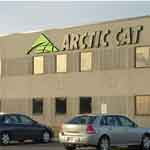Resources and services to drive growth in St. Cloud
.png)
Whether you're an entrepreneurial start-up or an expanding manufacturer, the St. Cloud Economic Development Department offers personalized services and access to critical resources. We can direct you to governmental and other entities offering incentives, typically tied to wage and job creation goals. Contact us and we will connect you with the business assistance most suitable for your needs, including:
- Grants for customized job training
- Loans for land acquisition, building construction, machinery, and equipment
- Tax credit for job creation
- Tax incentives for job creation and investments in targeted industry sectors
Business Counseling
Anderson Center
The Anderson Center provides engaging management and leadership development forums for executives to facilitate economic progress in Greater Minnesota. Forums are facilitated by skilled discussion leaders, who challenge participants to teach and learn from each other, through real-world case studies. Each forum provides a peer network, case studies, application exercises, and reference materials. Many forums offer an opportunity for professional and continuing education credits.
Minnesota Trade Office (MTO)
The MTO provides professional export counseling and assistance from international trade representatives. Experts guide small and midsized companies through the challenges and opportunities of conducting global business, including technical, regulatory and logistical information, market intelligence and research, and conducting business across borders and cultures. The MTO also offers educational seminars, workshops, and export events. The STEP program provides financial and technical assistance to qualifying MN small businesses. Eligible small businesses may apply for reimbursement up to $500 for export training, which will result in developing an export strategy, or up to $7,500 for approved export development activities.
Central Region Small Business Development Center (SBDC)
The Central Region SBDC at St. Cloud State University provides one-on-one professional and confidential business consulting at no cost. Pre-venture, start-up, and established businesses can all obtain professional expertise and guidance to identify and secure financing and training programs for owning and operating a business.
SCORE of Central Minnesota
SCORE provides free and confidential business counseling to assist people in starting a new business, as well as existing small and mid-sized business owners. SCORE volunteers are real-world professionals with expertise to help small businesses succeed. Counselors are experts in accounting, finance, operations, marketing management, and business plan preparation.
Women's Business Alliance
State Loans & Grants
Minnesota Job Creation Fund
The fund provides up to $1 million in grants to approved industrial, manufacturing, and technology-related businesses, after specified job creation and capital investment goals are achieved. Minimum requirements include ten jobs created and a $500,000 capital investment. Actual job creation and capital investment rebates are based on project parameters.
Minnesota Investment Fund
The Minnesota Investment Fund offers a maximum of $500,000 per grant. The fund focuses on industrial, manufacturing, and technology-related industries that increase the local and state tax base, and improve economic vitality statewide. Grants are awarded to local units of government, which use the money to provide below-market rate loans to help companies expand. Funding may be used to purchase land, machinery, and equipment.
City Loans & Grants
Tax-Exempt Industrial Development Bonds
The program provides manufacturers with below-market rate financing for the purchase of real estate and fixed assets.
General Loans & Grants
Brownfields Guide
The Brownfields Guide provides a comprehensive document to assist with the financing of brownfields in Minnesota. The guide helps explain the importance of redeveloping brownfield sites and contains essential information on the various types of funding available to assist with the cost of cleaning up and redeveloping contaminated sites.
Community Reinvestment Fund USA (CRF)
With access to several government lending programs, including Small Business Administration (SBA) and New Markets Tax Credits (NMTC), as well as specialized financing tools, CRF can fund commercial real estate purchases, business equipment purchases, leasehold improvements, working capital, and other business projects.
Minority Business Assistance Programs
Metropolitan Economic Development Association
Metropolitan Economic Development Association (MEDA), assists businesses owned and managed by entrepreneurs of color, with financing and access to market opportunities. In addition, MEDA hosts the MN Procurement Technical Assistance Center (MN PTAC), which helps all Minnesota businesses pursue government procurement opportunities. MN PTAC offers specialized support for women- and veteran-owned businesses.
Milestone Growth Fund
The Milestone Growth Fund provides financing to businesses owned by entrepreneurs from African-American, Asian-American, Latino, and Native American communities. Various debt-with-equity investment instruments are offered in the range of $200,000 to $500,000. To begin the funding process, companies must be prepared to submit a formal request and business plan.
State Tax Credits
Capital Equipment Exemption
Beginning July 1, 2015, businesses that buy or lease qualifying capital equipment (machinery and equipment used in manufacturing) for use in Minnesota, are eligible for an up-front exemption from Minnesota state and local sales or use. Businesses must continue to pay sales tax and then request a refund from the Minnesota Department of Revenue.
Minnesota Historic Structure Rehabilitation Tax Credit Program
The Minnesota Historic Structure Rehabilitation Tax Credit Program offers a 20% state tax credit for qualified historic rehabilitation. It also offers project investors an option of a grant, in lieu of a credit. Only income-producing properties are eligible for this incentive. The State of Minnesota funds this tax credit/grant for eligible applicants who meet the program requirements. The building must be listed in the National Register of Historic Places, or be certified as contributing to the significance of a “registered historic district.”
Research and Development Tax Credit
Businesses with research & development (R&D) expenses in Minnesota may qualify for the credit for increasing research activities. The R&D credit equals 10 percent of qualifying expenses, up to $2 million, and 2.5 percent for expenses above that level. C-corporations, partnerships, and S-corporations are eligible to claim the credit through the Minnesota Department of Revenue.
City Tax Credits
New Markets Tax Credit
A financing tool available for commercial real estate development projects in designated economically distressed areas of the City. Contact St. Cloud EDA for details.
Tax Increment Financing (TIF) and Tax Abatement
TIF and tax abatement are tools the City may use to help finance project costs. These tools encourage private development and pay for public improvement costs such as streets, sidewalks, sewer and water, and similar public infrastructure improvements. State statutes define the eligibility parameters and generally are targeted to new developments that increase the tax base, provide employment opportunities, or redevelop blighted areas.
Tax increment or tax abatement are the proceeds derived from the difference between the base property tax value of parcels, and the increased property value of parcels due to new development. The total amount of tax increment or tax abatement, is calculated for the projected term of the district. A developer can then obtain a loan based on the projected tax increment revenues, to use the funds upfront for public improvements.
The City of St. Cloud Business Financial Assistance Policy is the basis for reviewing all TIF and tax abatement projects.
Worker Training
Minnesota Job Skills Partnership Program
This MN DEED program partners strategically with businesses and schools to train or retrain workers, expand opportunities, and keep high-quality jobs in the state. Grants of up to $400,000 are awarded to educational institutions that partner with businesses to develop new job training for retaining existing employees.







